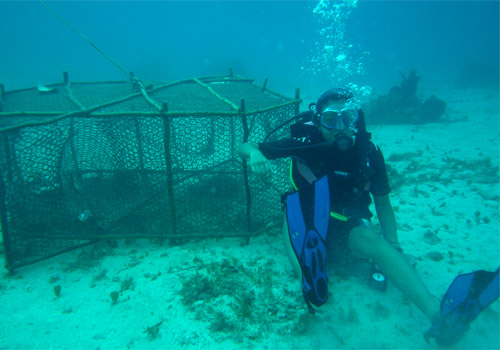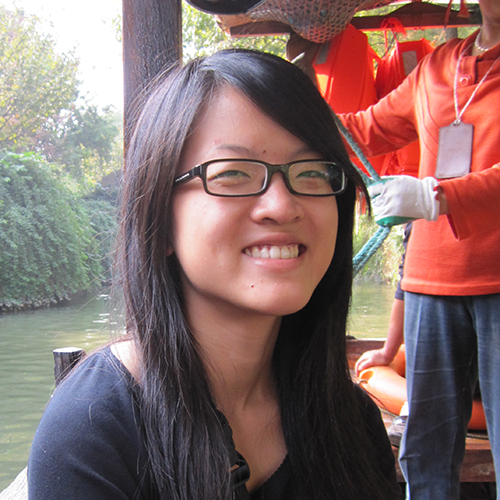
28 Jun Cheryl Chan – Bluefields, Jamaica

Cheryl Chan is a member of the Environmental Change and Governance Group (ECGG); School of Environment, Resources, and Sustainability; University of Waterloo
“I initially became interested in coastal-marine systems and small-scale fisheries through recreational scuba diving” replied CCRN member and recent graduate Cheryl Chan. “I started diving about five years ago. During my initial experiences in the water, I witnessed the challenges that both coral reefs and small-scale fishing communities are facing. I became interested in the relationships between humans and natural systems, and began exploring graduate opportunities to pursue research in this field.” Cheryl completed her master’s degree at the University of Waterloo in the School of Environment, Resources, and Sustainability. Her thesis, supervised by CCRN member Derek Armitage, examined how a marine protected area influenced the ecosystem services and social wellbeing of a small scale fishing community in Jamaica. Cheryl found that the CCRN network gave her the opportunity to meet mentors and other early career researchers.
Continue reading to learn more about Cheryl’s thesis “Ecosystem Services and Social Wellbeing Linkages: The Impact of a Marine Protected Area in Bluefields, Jamaica” and the insights she gained while completing her master’s degree.
What excites you about the work you did for your thesis?
First, I was excited by the opportunity that I was given to work with communities and to experience a new culture. Ultimately, I found this research to be one of the most trying and rewarding experiences that I’ve ever had. Through my master’s, I was able to see the barriers that prevent the translation of research into practice. I hope to pursue this “gap” further in the next stages of my career. In particular, during my degree, I uncovered my passion for science communication—to become aware of something that I really, truly care for is both exciting and something that I am thankful for.
Did you run into any difficulties during your studies? If so, how did you address them?
I think that being a graduate student is hard for a number of reasons—particularly for me, since I did not complete a thesis or major research project during my undergraduate degree. It was hard to figure out where to start my research, how to go about it, and how to deal with the isolation that I felt while I was in the field. Then, there was difficulty in figuring out how my research fit into the larger context of the world, and how—to paraphrase Ghandi—it could shake the world in a gentle way. I found that what got me through the day and through this degree was the strong support that I felt from my research network (including the Environmental Change and Governance Group; School of Environment, Resources and Sustainability at the University of Waterloo; and CCRN) and friends and family back home. However, I’m still trying to figure out how to “shake the world”.

Pelicans perched atop the remains of an abandoned wharf. Since the implementation of the Marine protected area, many locals and fishers have reported witnessing the return of shorebirds.
How does your research affect the community you worked with?
I hope that my research gave the people of Bluefields a safe space to voice their concerns. I hope the community feels that their voices are important and valuable, and that their ideas and concerns can be a catalyst for change. The next step of my work is to provide a brief summary of this research for Jamaica’s Ministry of Agriculture and Fisheries. The purpose of this summary is to inform the governance of marine protected areas in Jamaica. Lastly, through sharing the stories of Bluefields with a broader audience, I hope that people will become more aware of the challenges being faced by small-scale fishing communities and Small Island Developing States around the world, and take some form of action on behalf of and/or with these communities.
What do you think are the next steps for learning more about the topics you addressed in your thesis?
I hope to publish a paper or two from my thesis. Is my supervisor reading this? J I think that publishing will be a good opportunity to learn more about the academic literature that defines this field, and the current research that is happening. From a broader and more practical perspective, I want to become involved in projects with civil societies, government, and/or NGOs that relate to the topics that I addressed in my thesis.
How does your research contribute to your field?
I think my research offers new insights into the governance of coastal-marine systems, particularly in the context of marine protected areas and small-scale fisheries. While there is a huge body of literature that already exists in these contexts, my research provides further support for the consideration of social and cultural dimensions in conservation initiatives.

The marine protected area examined in the thesis, with fishing vessels in the foreground and patrol boat docked in the background.


